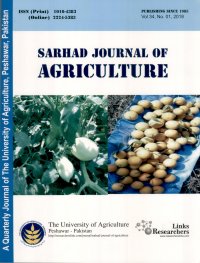Impact of Agricultural Credit on Wheat Productivity in District Jhang, Pakistan
Impact of Agricultural Credit on Wheat Productivity in District Jhang, Pakistan
Nisar Ahmad1*, Inayatullah Jan2, Saif Ullah1 and Sidra Pervez1
ABSTRACT
Agriculture is a major sector of Pakistan’s economy as it has a significant contribution to GDP, employment generation, and export earnings in the economy of Pakistan. Due to modernization in agriculture sector over the last few decades, credit needs of the farmers have increased rapidly. Credit is considered an important factor for raising the productivity and income of the farmers. The current study attempts to analyse the impact of credit on wheat productivity in district Jhang. Furthermore, study explores the purpose of farmers for acquiring loan and major sources of credit in district Jhang. This study is based on primary data collected in 2013 from eight villages in district Jhang – Punjab, Pakistan. The district was divided into four zones and two villages were selected from each zone. An equal number of beneficiaries and non-beneficiaries, i.e. ten each, were selected from each village. Thus the total sample size was 160 farmers. Cobb Douglas Production Function (CDPF) was used to analyse the data. The results of the study indicate that credit has positive effects on wheat productivity. Analysis shows that only 30% of credit users are utilizing loan for the purchase of seed and fertilizers while 70% are utilizing loan for other purposes as for marriages & ceremonial and for purchase of agriculture land & tractor etc. Similarly, 80 percent of credit users are borrowing from Zarai Tarqiati Bank Limited (ZTBL). It is suggested that financial institution should expand the credit facilities to the farmers which shall be utilized exclusively for agricultural purposes. It is also suggested that credit constraint should be plausibly minimized so that small farmers could also get loans easily.
To share on other social networks, click on any share button. What are these?







